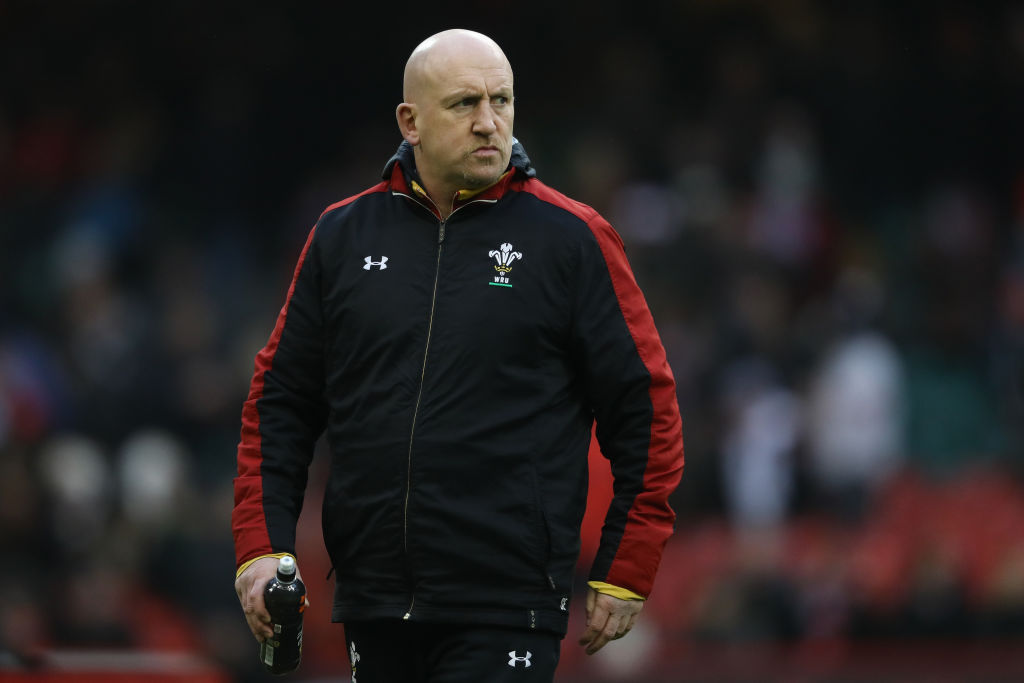Jackson column: Shaun Edwards knows how to win at Twickenham

CARDIFF, WALES - FEBRUARY 11: Sean Edwards the defence coach of Wales looks on as his team warm up prior to kickoff during the RBS Six Nations match between Wales and England at the Principality Stadium on February 11, 2017 in Cardiff, Wales. (Photo by David Rogers/Getty Images)
By Peter Jackson
Shaun Edwards has been in the habit of cleaning up at Twickenham ever since his Wigan team made light work of what remained of rugby‘s Berlin Wall. Winning the Middlesex Sevens more than 20 years ago meant more than removing what was left of the barricades put up a century earlier with the breakaway of the northern clubs from the RFU over their refusal to allow broken-time payment.
His playing days behind him, Edwards reinvented himself as one of the new breed of League coaches crossing the Rubicon during Union’s early years of professionalism. What began as a novelty one May weekend at the end of the 20th century had almost turned into a regular event during the 21st.
Between 2003 and 2007, Wasps stormed Twickenham in three English Premiership Grand Finals and two European Cup finals with Edwards as their defence coach. They won the lot, initially under Warren Gatland‘s direction, latterly Sir Ian McGeechan’s.
Despite collecting enough silver to have kept the Grimethorpe Colliery Band in splendidly euphonius tune, Edwards got the distinct impression from the RFU that they were less than impressed. If they had been, then theirs was a strange way of showing it, offering him nothing more challenging than a part-time role with the second-string Saxons.
As the English kingmakers dithered, Wales went for broke and offered Edwards a reunion with Gatland under their banner. And the pair of relocated Wasps, one from Wigan, the other Waikato, duly announced the resumption of their Twickenham removal business at the earliest opportunity which happened to be ten years ago this very weekend.
To say they managed it against the odds would be a gross understatement. In the Six Nations the previous season, Wales had lost the first four and avoided the Wooden Spoon by beating a confused England team at Cardiff in the last match. And a fat lot of good it did them. Months later, they were dumped out of the World Cup at the pool stage by Fiji in Nantes.
England, reappearing for the first time after confounding the odds and themselves by reaching the World Cup final in Paris the previous autumn, ought to have been more than 20 points clear by half-time. Wales staggered into their dressing-room, hanging on for dear life.
Somehow they turned it round, coming from 19-6 behind to complete what still stands as the longest come-back in the tournament. They did so once the penny had dropped, that the loss of three injured players had reduced England to an unusually fragile condition.
They had run out of wing forwards at half-time, losing Lewis Moody, then his replacement, the luckless Wasp Tom Rees. Ben Kay, a specialist lock, spent the second half stuck on the blindside of the back row which posed an obvious lack of mobility.
As if that wasn’t serious enough, England proceeded to throw their sinking opponents no shortage of lifebelts, aiding and abetting their recovery with a series of blunders. Jonny Wilkinson literally threw away one try, Iain Balshaw kicked away another and Wales were on their way to the most unexpected of Grand Slams.
They had scored 20 points without reply and won going away, as they say in racing circles. Edwards and Gatland would have been entitled to believe that no corner was too tight for a team of theirs, not at Twickenham as they showed again four years later en route to another Slam and in the 2015 World Cup.
They will be back there on Six Nations business this weekend for the last time before the sun sets on their reign at next year’s World Cup in the Land of the Rising Sun.
Of the come-back team of ten years ago, only one remains – Alun Wyn Jones.
If history is to repeat itself, then the Scarlets will have to defy the odds en masse as the next-door neighbours did in 2008. For the Ospreys on the international stage, that was their finest hour: England 19, Ospreys (plus one Scarlet and one Cardiff Blue) 26.
No European team has won at HQ since Lloyd Williams appeared as an emergency left wing and made the try that put England out and Eddie Jones in. Under his direction over the last 30 months they have swept all before them at Twickenham, ten out of ten at an average of 34 points per win.
A daunting prospect, but then none has proved too daunting for Edwards and Gatland at their happy hunting ground.
After the roller-coaster nature of their first Welsh experience there, anything else ought to be, if not a piece of cake, then relative plain sailing for the Oldest Firm on the international stage.